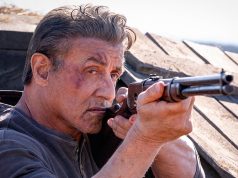I haven’t seen the original 1971 “Get Carter,” which starred Michael Caine, but I have to believe it was better than the damp new version starring a surprisingly inarticulate (even for him) Sylvester Stallone.
Set in a version of Seattle in which it never stops raining and is always nighttime, the film is about Jack Carter (Stallone), a Las Vegas hired thug who has come home for his brother’s funeral. Seems Richie got plastered and ran into a tree, but this seems fishy to Jack, who had never known his brother to be much of a drunk, especially not an irresponsible one. So it’s up to Jack to go right to the police and express his doubts about the manner in which Richie died.
I’m kidding, of course; I don’t think there even ARE any police in this movie. What Jack does is go investigating. “Investigating” to him means asking, “What was Richie into?” a lot, and pestering guests at his widowed sister-in-law Gloria’s (Miranda Richardson) post-funeral gathering.
Richie worked at a bar owned by Cliff Bumby (Michael Caine, proving that if he can weasel his way into a movie, he will), who insists Richie’s only vice was that he had a woman on the side. That woman is Geraldine (Rhona Mitra), a gorgeous, uncooperative gal who helps very little. Also involved, somehow, are smarmy tycoon Jeremy Kinnear (Alan Cumming) and beefed-up something-or-other Cyrus (Mickey Rourke). And dead Richie’s sulky daughter Doreen (Rachel Leigh Cook), first apprehensive about her uncle whom she doesn’t know very well, eventually warms up to him and tries to assist.
Stephen T. Kay directs with a flair for catchy visuals and adrenaline-pumping soundtrack music (everything from hip-hop to techno-jazz). He goes overboard a bit with the wobbly, sped-up fighting scenes, which are so grainy and dreary as to almost appear black-and-white, but the obligatory car chase has enough quick cuts and near-misses to infuse some excitement into that old movie cliche.
Unfortunately, Kay also seems to think he’s David Fincher, redoing “Fight Club” or “Seven.” The camera tricks get old, and the film practically chokes on its own moody atmosphere.
Of course, it may well be that he was just trying to do something, anything, to make the film interesting, given Stallone’s characteristically uncharismatic performance and the dead-boring David McKenna script he had to work with. For an action movie, there is an awful lot of sitting around, and the movie progresses with infuriating sluggishness. Style doesn’t make up for lack of substance, and a style that wears thin helps even less.
D (; )





